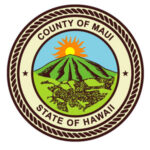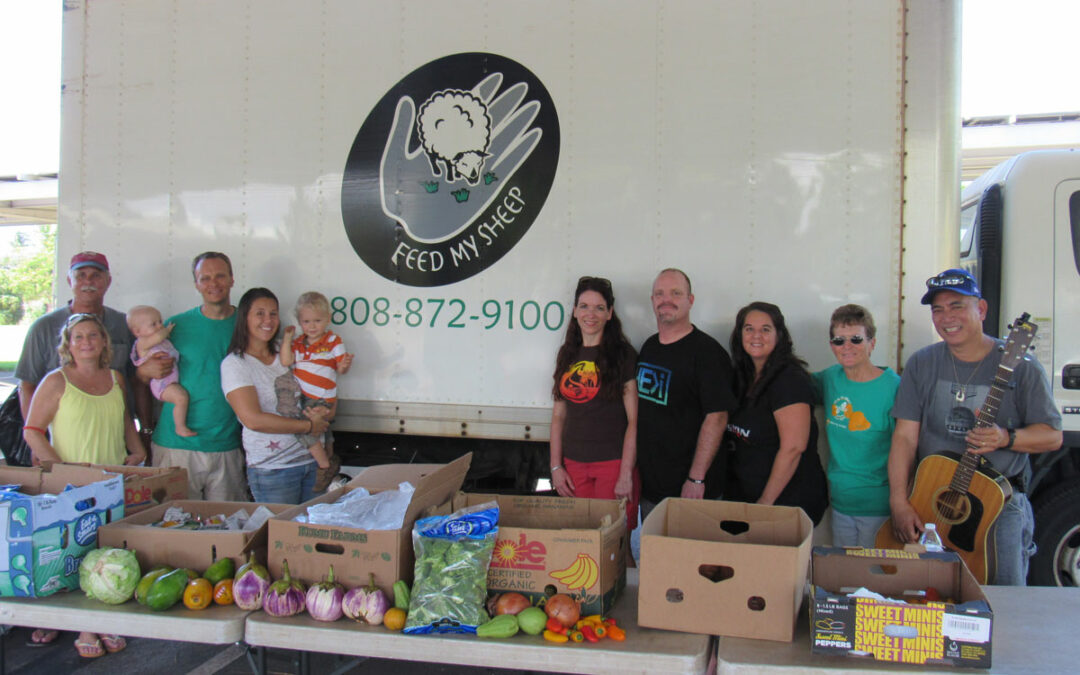
Dec 20, 2017 | Community, Sustainability
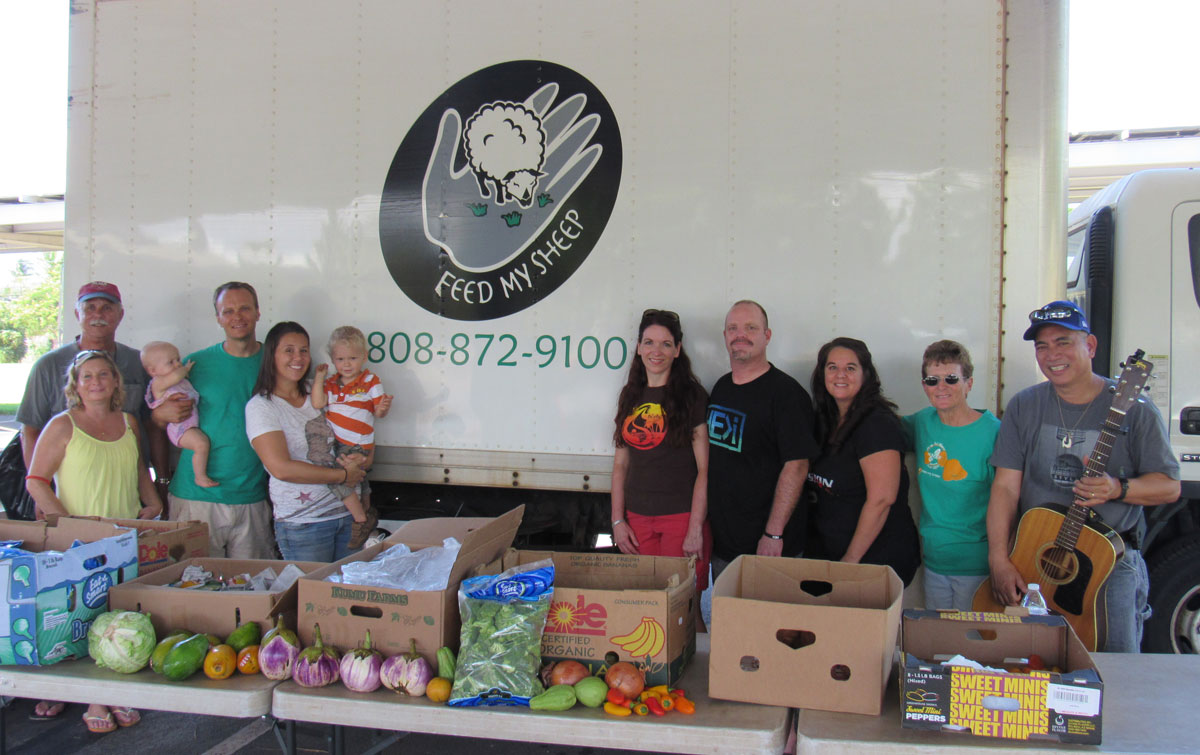
Maui Economic Development Board applauds the community service of Feed My Sheep (FMS). Serving with integrity and sincerity, this nonprofit makes an immediate impact on the lives of the less fortunate. Bringing positive hope, the many FMS volunteers lift the morale of low-income workers and the unemployed while helping them through rough economic times. “In an effort to make Maui hunger-free, FMS provides about 69,000 half-pound meals a month throughout the island,” said FMS Founder and CEO, Joyce Kawakami. “In the last year we have given food to 3,200 people including working but poor families, seniors on fixed incomes, and homeless men and women. A few moments of emotional support are offered to each person who comes, besides food for their week. We feel blessed to serve so many.”
A unique mobile food distribution program, FMS takes deliveries to designated neighborhoods of need each week. Bags of food are distributed to the needy in five different locations. “Anyone who needs food is welcome to come to one of our many mobile food distributions,” said Operations Director Scott Hopkins. “Our volunteers make FMS such a welcoming place. Plus, many local farmers offer participants a focus on healthier food choices.” For example, Kumu Farms provides FMS with healthy options for both their free distributions and their discounted produce market. They have been a consistent source of nutritious items such as kale, papaya, chard, bananas, arugula, salad greens, beans and fennel.
FMS staff surveyed over 100 people to find out how fresh produce, fruit and vegetables have benefited the participants. “Ninety-six people said that the food they received from FMS improved their health in ways that doctors confirmed,” Hopkins noted. “We documented reduced blood pressure, better heart health, improved mental clarity and increased strength. Through FMS I have seen many people go from their lowest point to a new beginning. That’s what makes it all worthwhile!” FMS is always seeking volunteers for distribution locations in Hana, Lahaina, Wailuku, Kahului, and Kihei. To inquire call (808) 872- 9100.
Through Feed My Sheep I have seen many people go from their lowest point to a new beginning. That’s what makes it all worthwhile!
Scott Hopkins, Feed My Sheep Operations Director
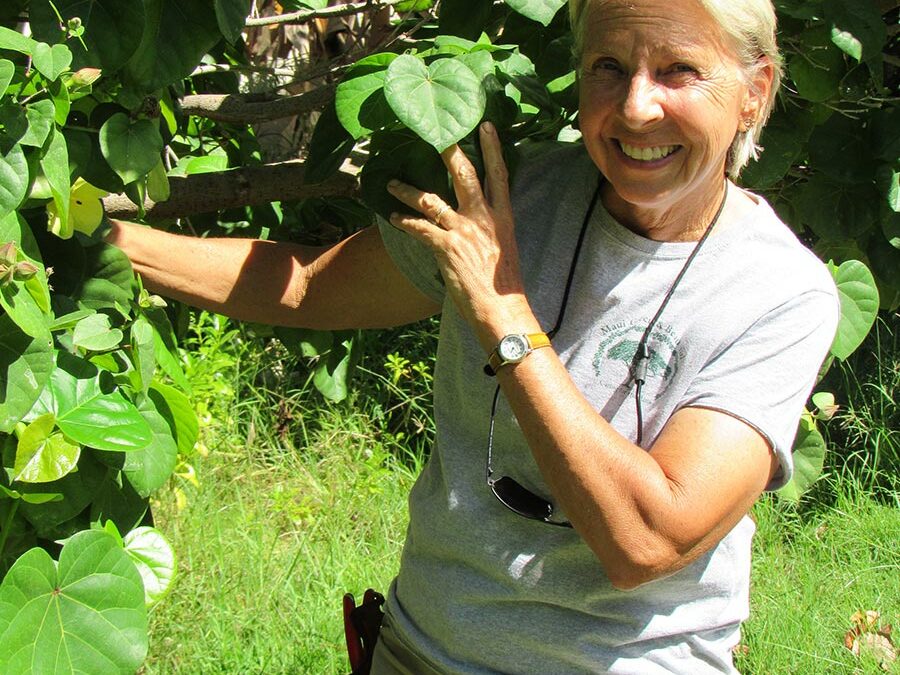
Nov 8, 2017 | Environment, Sustainability
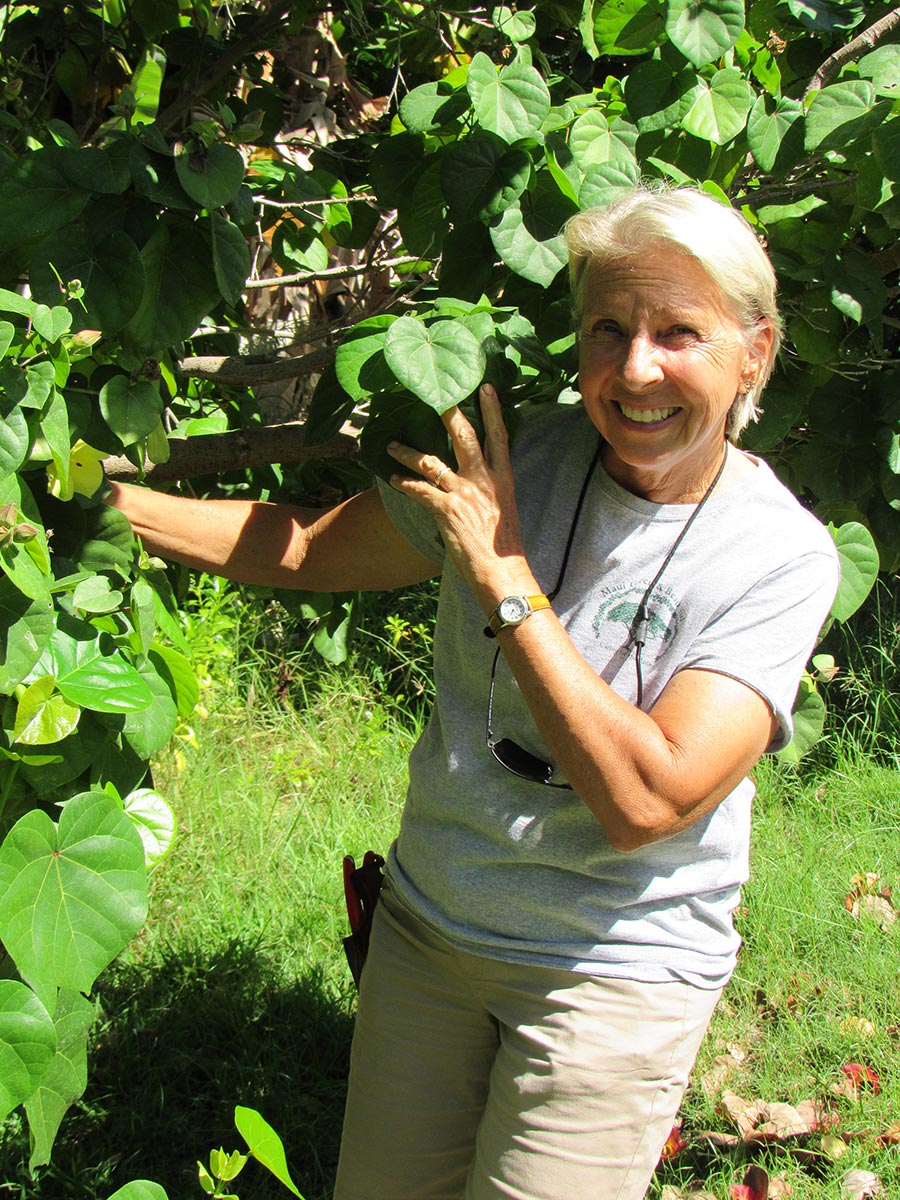
Maui Green & Beautiful (MG&B) is an environmental non-profit that cares for the ‘Ᾱina through preservation, protection, and education. Originally known as the Maui Outdoor Circle, in 2014 it reorganized as MG&B. “Our education curriculum includes proper care and pruning, benefits of trees, protecting our healthy mature trees and teaching the value of trees,” said Elaine Malina, MG&B president. “We have created bridges with, and have earned respect from, the landscape and tree professionals in our community. Some of our recent tree plantings include jacaranda trees along Haleakala Highway with the Eagle Scouts, trees planted in Keopuolani Park in Kahului with the Maui County Arborist Committee, and much more.”
Malina’s love of trees began with a black walnut tree in her childhood backyard in the Chicago suburbs. Her parents used to take her to botanical gardens which evolved into her receiving a degree in Ornamental Horticulture. “I became an International Society of Arboriculture Certified Arborist in 1997 and graduated from the University of Hawaii College Foundation Agricultural Leadership Training Program in 2002.”
MG&B is celebrating Arbor Month with two special events in November. A Kaulunani Grant is allowing them to bring the TreeCircus, an educational tree event, to four Maui schools. “The TreeCircus show lasts almost an hour with non-stop energy and student participation,” Malina said. “The grant is also allowing us to purchase educational material that we will donate to each participating school.”
The 7th Annual Malama the Trees Free Educational Workshop will be held on November 11th. This year, MG&B is honoring the Maui County Exceptional Trees of Wailuku. The event begins at 9am in front of the County Building with an hour-long presentation about tree topics including the Maui County Planting Plan. “We will also discuss tree infrastructure, tree biology, tree planting, and other issues,” said Malina. “After the hour presentation, we will break into small groups with a certified arborist to guide us through Wailuku. We will finish at Kaahumanu Church’s exceptional tree at 12 noon. For more information visit: mauibeautiful.org.
We need trees to breathe. Trees remove carbon dioxide from the atmosphere and release oxygen through a process called photosynthesis. Trees are cool.
Elaine Melina, President, Maui Green & Beautiful
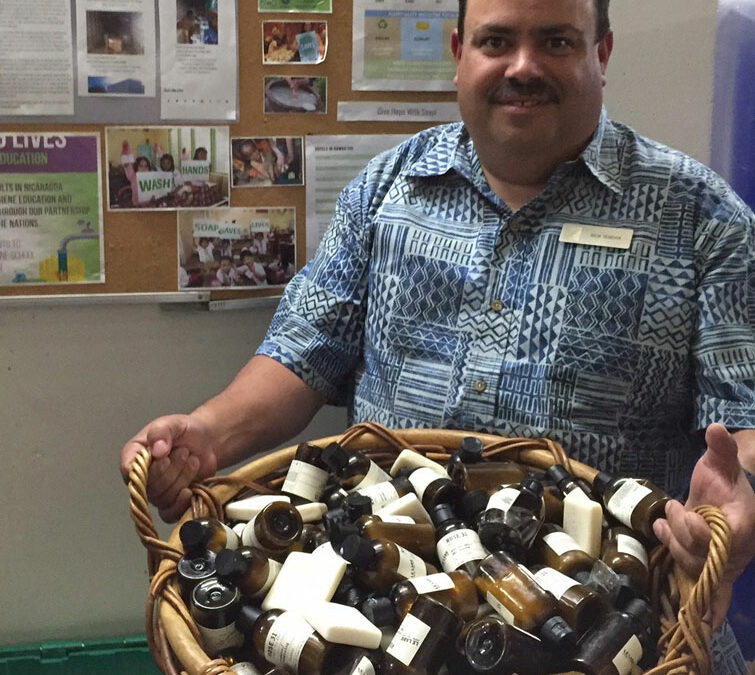
Dec 21, 2016 | Community, Environment, Sustainability
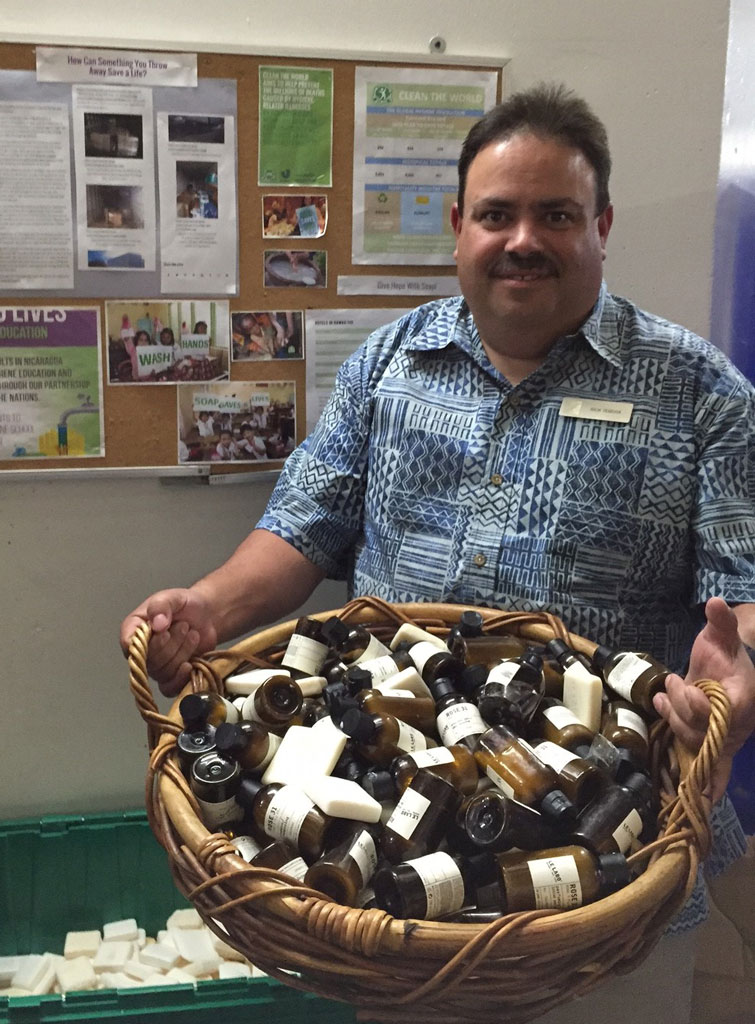 The Fairmont Kea Lani Resort, venue for Maui Economic Development Board’s annual Ke Alahele Fundraiser, is committed to responsible tourism practices and sustainable hotel management. “Our Sustainability Team, created in 2001, is comprised of leaders and colleagues dedicated to “greening” our operations and cultivating an enduring connection to the land and community,” said Rick Texeira, Chair, Fairmont Kea Lani Sustainability Team. “To date, the Sustainability Team has launched over 50 environmental initiatives at the resort, including the installation of over 1,528 solar photovoltaic panels, efforts in support of the critically endangered Hawksbill sea turtle at neighboring White Rock beach, and our sponsored Earth Day community reef clean-ups, to name a few.”
The Fairmont Kea Lani Resort, venue for Maui Economic Development Board’s annual Ke Alahele Fundraiser, is committed to responsible tourism practices and sustainable hotel management. “Our Sustainability Team, created in 2001, is comprised of leaders and colleagues dedicated to “greening” our operations and cultivating an enduring connection to the land and community,” said Rick Texeira, Chair, Fairmont Kea Lani Sustainability Team. “To date, the Sustainability Team has launched over 50 environmental initiatives at the resort, including the installation of over 1,528 solar photovoltaic panels, efforts in support of the critically endangered Hawksbill sea turtle at neighboring White Rock beach, and our sponsored Earth Day community reef clean-ups, to name a few.”
An especially interesting Kea Lani program, in partnership with Clean the World Foundation, Inc., recycles hygiene products, soap and bottled amenities for worldwide distribution to fight hygiene-related illness. “Clean the World takes our unused soap, shampoo, conditioner, lotion, and shower gel and gives them a second life through a global hygiene initiative,” Texeira explained. “The distribution of recycled soap and hygiene products from hotels and resort partners helps millions of people in countries with a high death rate from these illnesses.”
Recycling with Clean the World and other sustainability projects are a great way to achieve corporate social responsibility goals and attract more guests. “The programs increase employee morale and visitors love it as well,” said Texeira. “I’m so proud of the commitment and effort our hotel has shown. Not only are we recycling, we are helping those in need and supporting the health and wellness of others. It is wonderful to see how simple and responsible acts can save so many lives. We look forward to continuing our sustainable movement for many years and are passionate about our efforts to make a difference for people, our communities and the planet.”
Our hotel has contributed to Clean the World’s distribution of soap, amenities, and hygiene kits in 96 countries.
Rick Texeira, Chair, Fairmont Kea Lani Sustainability Team
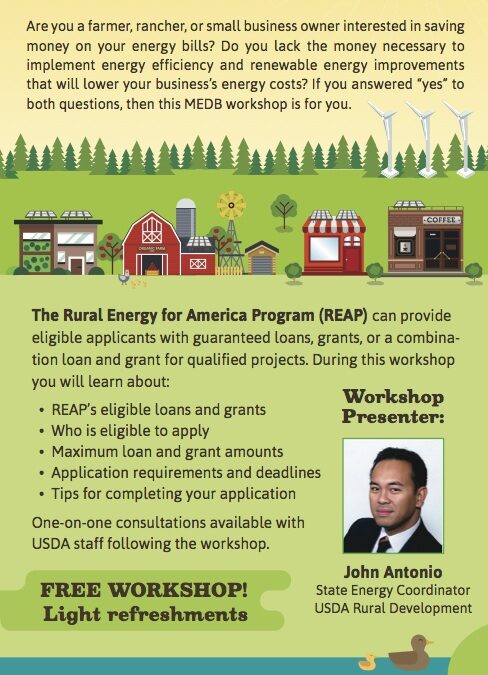
Jul 27, 2016 | Environment, Sustainability
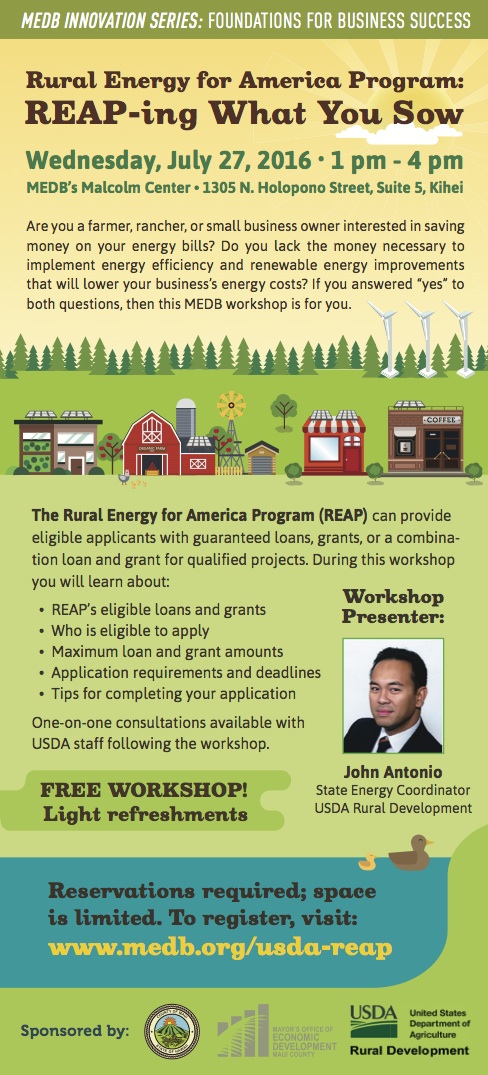 Are you a farmer, rancher, or small business owner interested in saving money on your energy bills? Do you lack the money necessary to implement energy efficiency and renewable energy improvements that will lower your business’s energy costs? If you answered “yes” to both questions, then this MEDB workshop is for you.
Are you a farmer, rancher, or small business owner interested in saving money on your energy bills? Do you lack the money necessary to implement energy efficiency and renewable energy improvements that will lower your business’s energy costs? If you answered “yes” to both questions, then this MEDB workshop is for you.
The Rural Energy for America Program (REAP) can provide eligible applicants with guaranteed loans, grants, or a combination loan and grant for qualified projects. During this workshop you will learn about:
- REAP’s eligible loans and grants
- Who is eligible to apply
- Maximum loan and grant amounts
- Application requirements and deadlines
- Tips for completing your application
- One-on-one consultations available with USDA staff following the workshop.
Workshop Presenter:
John Antonio, State Energy Coordinator USDA Rural Development
The workshop is free, and light refreshments will be served. Part of the MEDB Innovation Series, Foundations for Business Success.
Wednesday, July 27, 2016, 1 pm – 4 pm
MEDB’s Malcolm Center
1305 N. Holopono Street, Suite 5
Kihei, HI 96753
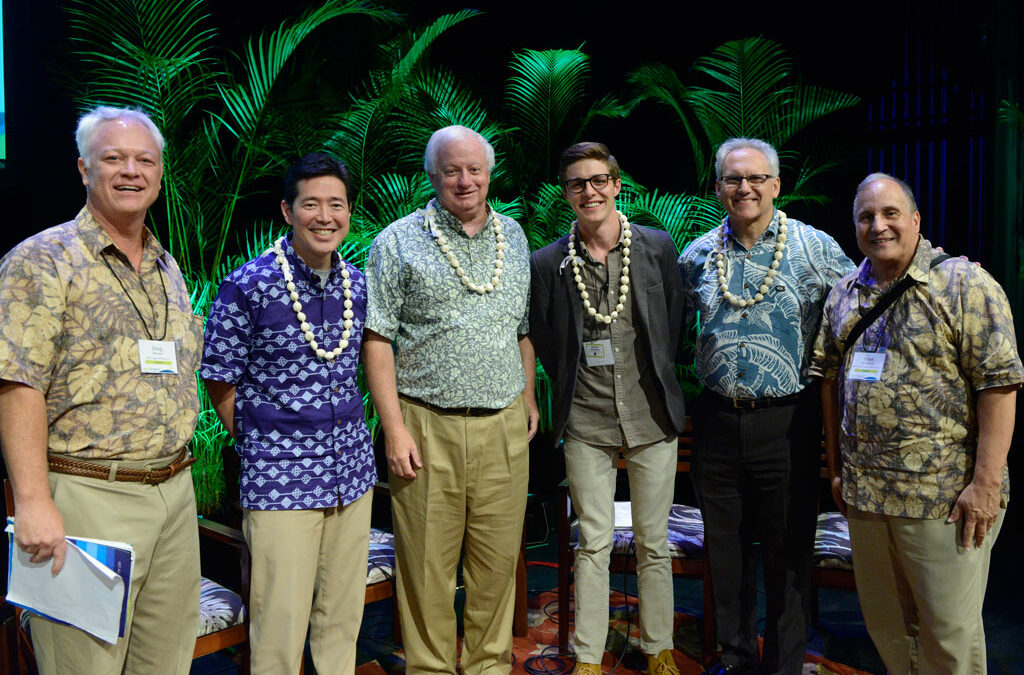
Mar 31, 2016 | Education, Environment, Sustainability
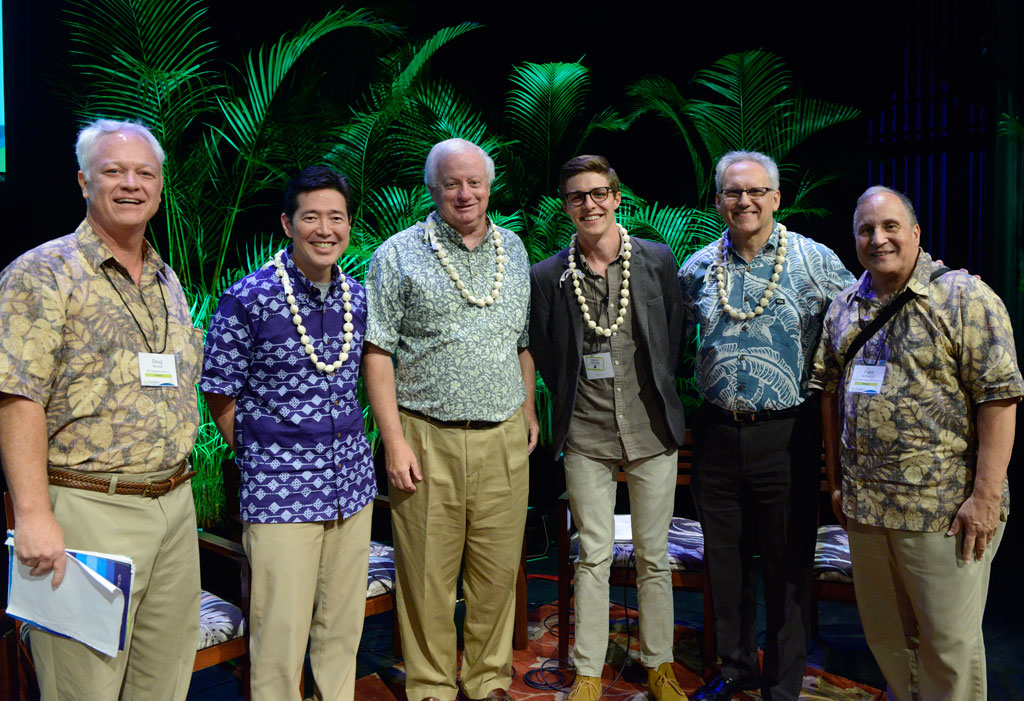
The 2016 Maui Energy Conference, presented by the Mayor’s Office of Economic Development and the Maui Economic Development Board (MEDB), focused on the Hawaii Clean Energy Initiative’s 100% Renewable Portfolio Standard (RPS), its implications for Hawaii’s energy future and the customer. The two-day conference, held at the Maui Arts and Cultural Center on March 16-17, was attended by over 300 participants, including nationally and internationally recognized experts in the field. “The event provided a platform where difficult and often contentious discussions can occur in an atmosphere of mutual respect and in-depth dialogue,” stated Frank De Rego Jr., Director of Business Development Projects at MEDB. “The issues around Hawaii’s 100% renewable energy portfolio standard are not only technologically complex, but have social, economic and cultural impacts as well.”
“Consider MECO’s pilot program to pay for ‘behind the meter’ energy storage on Molokai,” said Conference Program Committee Chair Doug McLeod. “Such a proposal would have been inconceivable in the first year of the Maui Energy Conference. The conference and its rebroadcast to the larger community via Akaku has raised the education level in our community so that MECO’s customers are presently asking for services like these home batteries.” Battery systems store the energy when nature makes it available and allows us to use that energy when we need it. “Storing solar energy is a key to enabling Hawaii to meet their 100% renewable energy goals,” said Boris von Bormann, CEO of sonnenUSA. Bormann went on to say that he envisioned a world where clean and affordable energy is available to all by networking systems of rooftop solar coupled with battery storage – an option that is already occurring in Germany.
“The customer is an integral part of a 100% renewable energy future,” said Shelee Kimura, Hawaiian Electric’s VP of Corporate Planning and Business Development, as the conference discussion turned to the potential impacts for the community of achieving a 100% RPS. For example, can everyone afford the cost of renewable energy? How do we balance the benefits of renewable energy for those households and businesses who cannot afford rooftop solar systems? The conference attracted a broad audience: 21 percent of participants traveled from the mainland or internationally to attend, with 37 percent from Maui and 42 percent from Oahu and other neighbor islands.
The Maui Energy Conference explored the challenges and opportunities in achieving 100% of our electrity generation through renewable energy sources.
Frank De Rego Jr., Director of Business Development Projects, MEDB
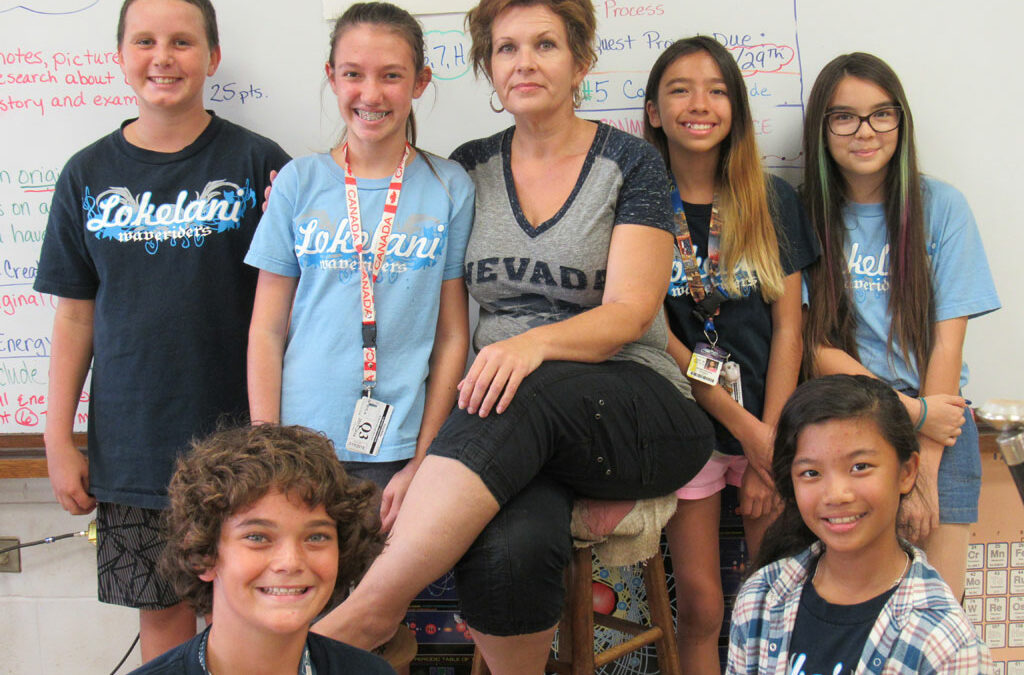
Feb 11, 2016 | Environment, Sustainability
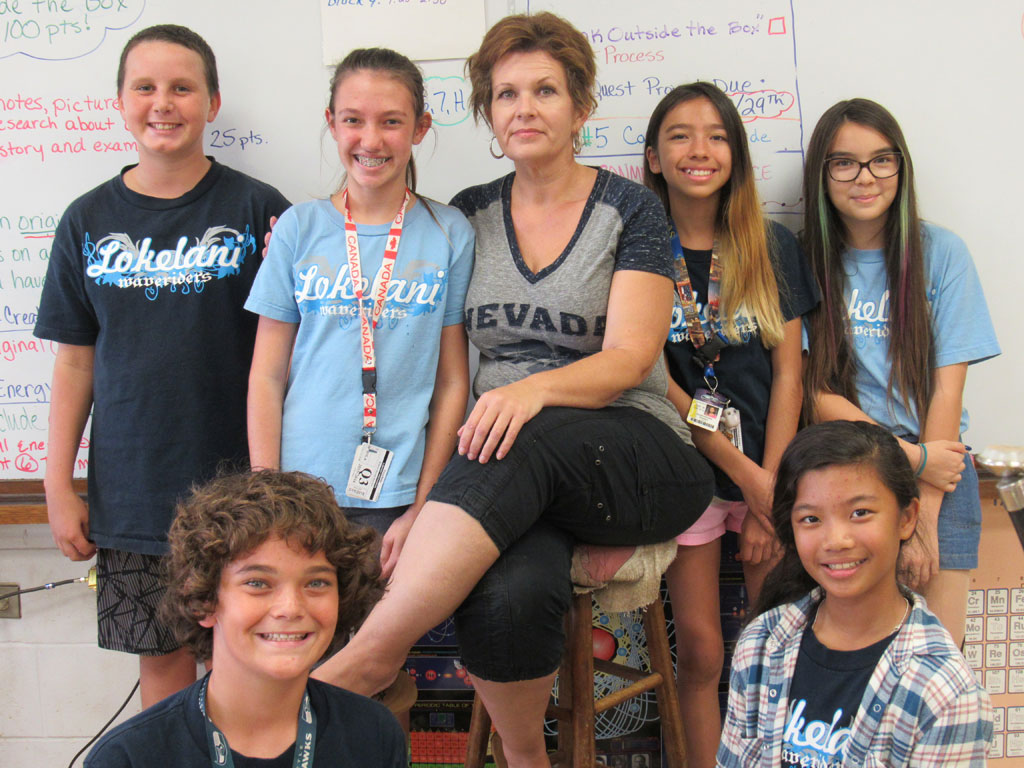
For the first time, Maui Economic Development Board’s (MEDB) Women In Technology (WIT) Project is presenting a student collaboration opportunity between Hawaii and California. Kamali’i Elementary School, Lokelani Intermediate and Kihei Charter High School on Maui, together with Elliott Ranch Elementary School and Cosumnes Oaks High School in California, have chosen their most environmentally conscious students to participate in The Pacific Clean Energy Exchange. “In an effort to inspire creativity and collaboration with their counterparts, the students will explore, via conference calls and digital sharing, clean energy solutions both in the Golden State and the Aloha State,” said Lesley Brashier, Elliott Ranch Elementary School teacher. “Plus, leadership and management skills will be practiced by the high school students who are mentoring younger student teams in fourth, fifth and sixth grades.”
The students will work together to synthesize their findings for a presentation at the MEDB Hawaii STEM (Science, Technology, Engineering and Mathematics) Conference on May 6-7, 2016. “The Pacific Clean Energy Exchange Program is the first of its kind,” said MEDB WIT Project Manager Melinda White. “Elementary and high school students are being tasked with exploring solutions for the global energy crisis. They’ll be contributors to a relevant world issue being tackled by the brightest scientists, engineers and political leaders.”
The discussions in this program are very diverse. How can renewable energy be better integrated into city planning? How can citizens be encouraged to utilize clean energy like solar, wind, ocean wave and tidal action when available? Are there more energy sustainable ways to cool the schools? In the culminating event, California and Hawaii teams will be able to meet in person when they offer their innovative ideas and solutions at the STEM Conference. “The Pacific Clean Energy Exchange is giving my students a chance to learn about the significance of Hawaii’s 100% renewable energy goal,” said Zayna Stoycoff, Lokelani Intermediate School teacher. “As one of my students recently explained, ‘No one individual can possibly make every contribution, but by coming together great goals can be reached.’ As a teacher, this is what it’s all about!”
The Pacific Clean Energy Exchange project is a one-of-a-kind STEM opportunity that joins students from Hawaii and California to collaborate on clean energy issues. I very much wanted to be part of this project to learn more about environmental science and hopefully contribute to Hawaii’s future.
Cole Logrande, Lokelani Intermediate School 6th grader
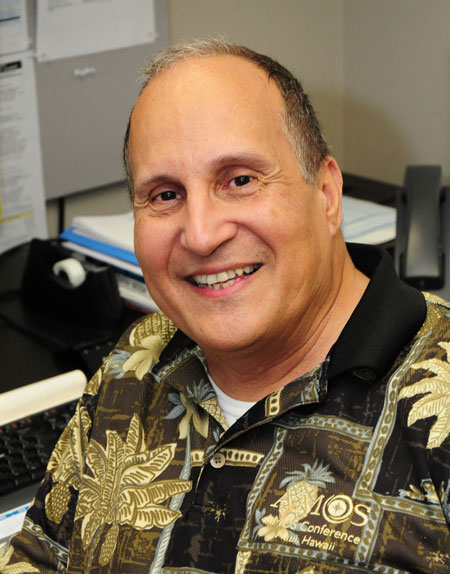
Jan 28, 2016 | Environment, Events, Small Business, Sustainability
The Mayor’s Office of Economic Development, Maui County and Maui Economic Development Board (MEDB) are hosting the third annual Maui Energy Conference, March 16-18 2016 at the Maui Arts & Cultural Center. Energy experts and stakeholders from across the U.S. and Hawaii will meet to learn about the latest advances in clean energy and how Hawaii plans to achieve the new 100% RPS (Renewable Portfolio Standard) target. On June 8th 2015, Hawaii updated legislation setting the 100% renewable portfolio standard by 2045. The standards are state and local policies that mandate all or certain types of electricity producers to supply a minimum share of their electricity from designated renewable resources. Hawaii has met its annual RPS requirements to date.

Frank De Rego, Jr. Director of Business Development Projects, Maui Economic Development Board, Inc.
“The 2016 Maui Energy Conference will bring together some of the best minds in the energy sector from Maui County, the state, and the nation,” said Frank De Rego, Jr., MEDB Director of Business Development Projects and member of the conference program committee. “The focus of discussion will be Hawaii Clean Energy Initiative’s 100% RPS and its implications for Hawaii’s energy future. The strengths of the conference over the years have been the high quality of its speakers and panelists, the ample time to network and the availability of the panel sessions to the general public at the conclusion of the conference on the conference website.”
The Conference will seek consensus about realistic targets and goals, the readiness of the utilities to reach them and how much this will really cost. Other issues include how to mitigate disruptions of energy supply and price when transitioning from carbon based fuels to renewables and the importance of a diversified portfolio. Looking at all the other questions: How; Where; Why; and Who Pays are just a few of the obvious issues. “Within ‘how’ and ‘why’ are important sub-questions about fairness and respect for Hawaiian culture and the environment,” said Program committee chair, Doug McLeod, DKK Energy Services. “In addition, the County of Maui’s energy consultant Guernsey has been invited to present their recommendation with regard to ownership of the electric utility on Maui.”
An early-bird registration rate of $395 for the Maui Energy Conference is available through January 31st — a discount of $100. Details on this year’s program are available at the Conference website, MauiEnergyConference.com
Frank De Rego, Jr. Director of Business Development Projects, Maui Economic Development Board, Inc.
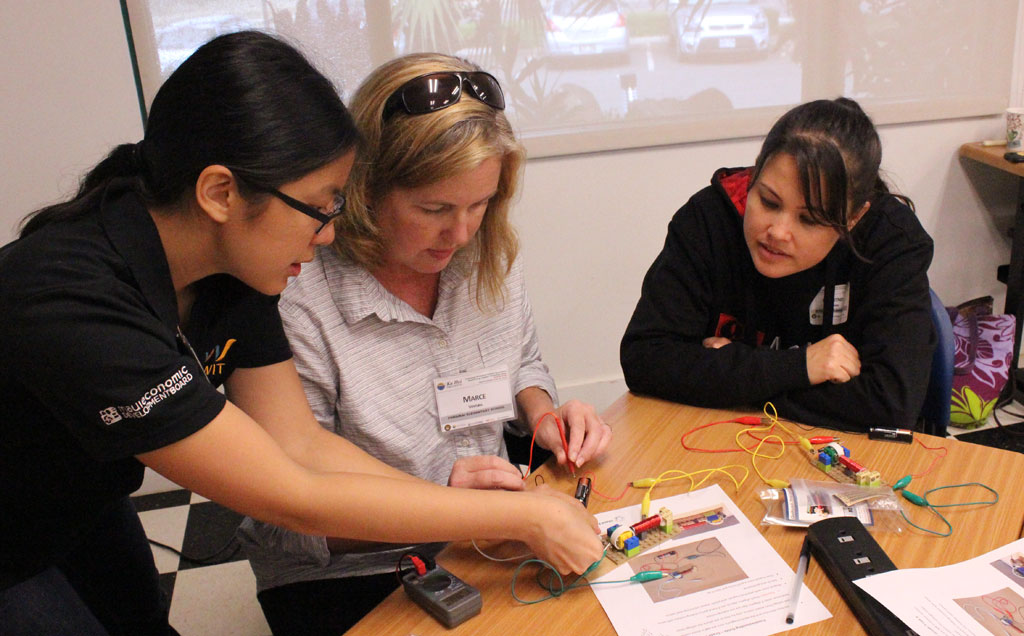
Jan 21, 2016 | Education, Environment, Sustainability

Since 2009, the Maui Economic Development Board (MEDB) Women In Technology program (WIT) has trained 459 educators through the energy science curriculum of its Island Energy Inquiry (IEI) initiative. In that time it has expanded from Maui across the state, reaching at least 49,000 students. IEI is the first energy education program designed for Hawaii teachers that combines scientific inquiry and engineering design processes with cutting-edge materials and technologies in the classroom. Teachers are using this new knowledge and hands-on activities to help middle and high school students learn about and perhaps someday solve the state’s energy concerns. “Through the IEI workshops, our MEDB team helps teachers educate for energy prosperity,” said Graham R. DeVey, WIT Project Manager. “Our hands-on, student-driven labs and activities use the natural curiosity of students to develop their skills for tomorrow’s high-tech jobs in renewable energy here in Hawaii.”
In recent Maui workshops for teachers of grades K through 5, WIT Project Assistant, Manda Tong supported the educators in an IEI electromagnetic motor lab, building the foundational concepts used in engineering wind and hydro generators. “In IEI courses, teachers learn as students do, by applying scientific skills through a hands-on approach,” Tong explained. The workshop series, focusing on photovoltaic electricity, wind energy, solar thermal energy and energy efficiency, incorporated presentations from local engineers and other industry representatives on various energy topics. Participating teachers also received hands-on kits to take back to the classroom, including miniature PV modules, a four-foot wind turbine and energy auditing equipment. WIT’s IEI Program, in partnership with Ka Hei, a Department of Education Program, also includes comprehensive energy efficiency and water conservation initiatives, sustainability measures, microgrids, science, technology, engineering and math (STEM) curriculum and community involvement.
To augment the IEI curriculum and make it more tech-relevant to teens, a companion Clean-Energy Hawaii STEM iPad app has been created by NSC Partners LLC, a Maui-based software developer. The app is available at the iTunes store and features Hawaii-specific clean energy content that can be adapted to support innovative energy science education in any community throughout the world.
Maui Economic Development Board’s Women In Technology Island Energy Inquiry Program (IEI) launched its elementary school curriculum this past fall, training 35 teachers of grades K through 5 to teach clean energy modules. The IEI program helps build student competency towards energy prosperity for Hawaii’s future.
Manda Tong, MEDB Project Assistant
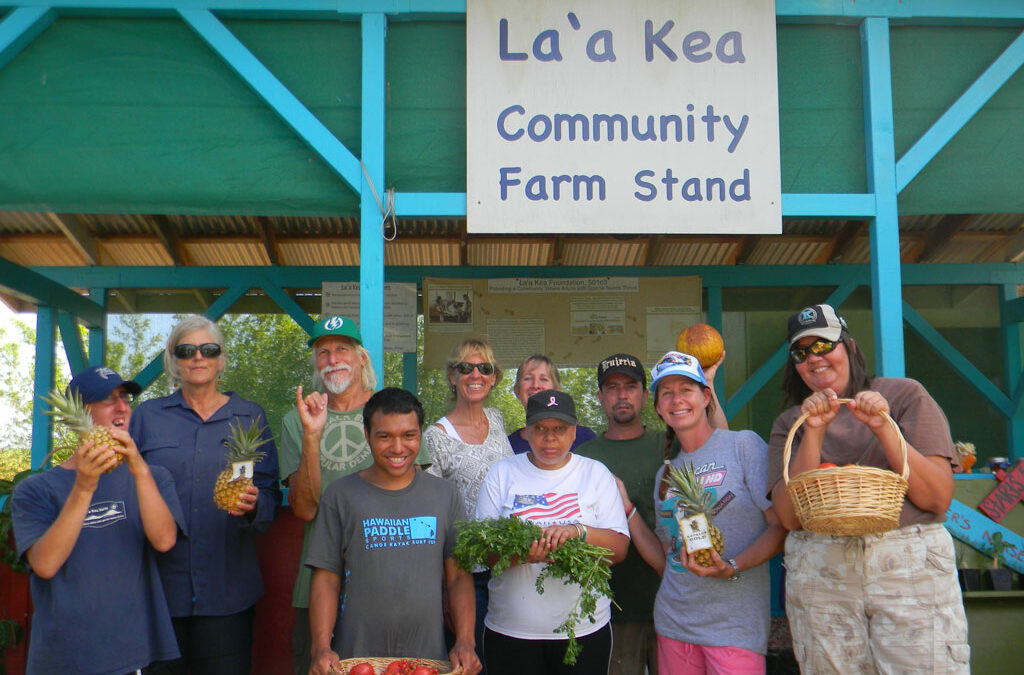
Nov 12, 2015 | Environment, Sustainability
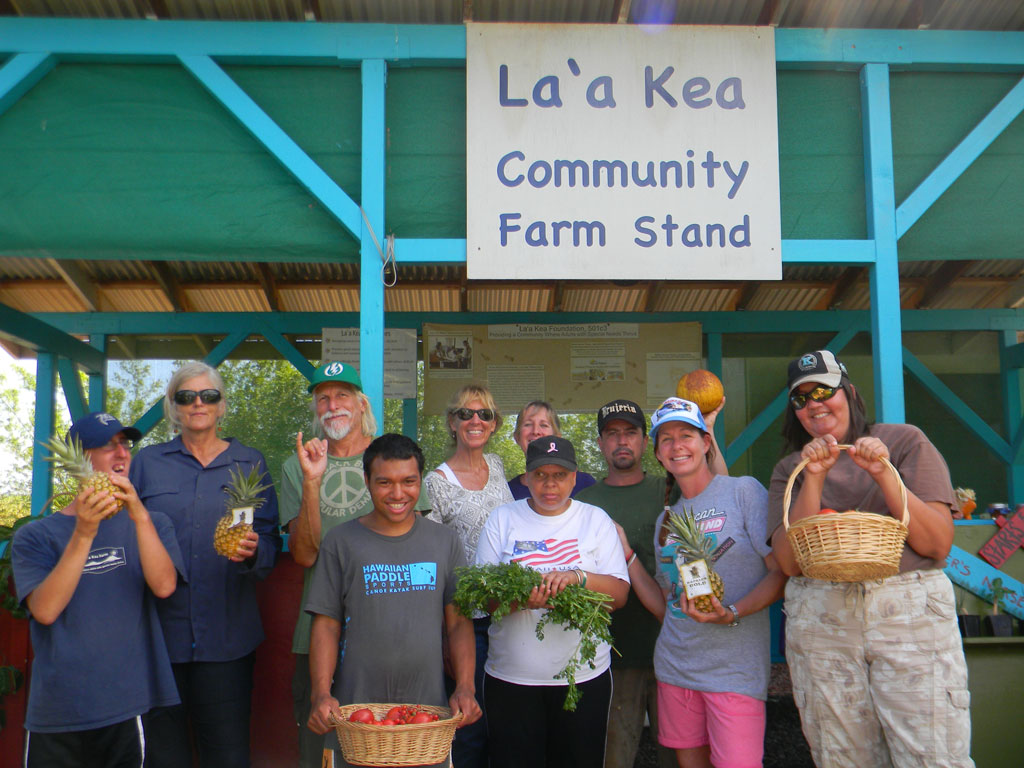 Imagine a place where the community reflects what is important and precious in each member. Imagine a place where the meaningful work that each individual contributes to the community is healing and inspirational. La‘a Kea Farm on Baldwin Avenue in Pa‘ia is that place. Sitting on 12 acres overlooking the ocean, with double rainbows and majestic white clouds, the farm inspires residents and visitors alike. Founded in June 2000, La‘a Kea, a 501(c)(3) nonprofit organization, provides day and residential programs for youth and adults with intellectual and developmental disabilities. It is the first of its kind in the State of Hawai‘i.
Imagine a place where the community reflects what is important and precious in each member. Imagine a place where the meaningful work that each individual contributes to the community is healing and inspirational. La‘a Kea Farm on Baldwin Avenue in Pa‘ia is that place. Sitting on 12 acres overlooking the ocean, with double rainbows and majestic white clouds, the farm inspires residents and visitors alike. Founded in June 2000, La‘a Kea, a 501(c)(3) nonprofit organization, provides day and residential programs for youth and adults with intellectual and developmental disabilities. It is the first of its kind in the State of Hawai‘i.
“Our mission is to create wholeness through education and therapy in extended family living,” said La‘a Kea Executive Director Andrea Hall Rodgers. “Being part of a thriving ‘ohana enables the members to fully unfold their potential and inspire each other. La‘a Kea’s programs include farming, economic ventures and the activities of daily living that come alive in a community with homes, farm buildings, a farmers’ market, cafe, craft studio and more,” said Rodgers. Inspired by the internationally known Camphill Village model, La‘a Kea offers a unique alternative to conventional care. Co-workers, residents and day program participants, regardless of their ability or disability, work in a supportive environment. They are all dedicated to discovering and enhancing the contribution of each individual through productive work.
In 2005, Rodgers presented the La‘a Kea project to Maui County Mayor Alan Arakawa. “It is an exceptional model of organic farming and equitable community living designed specifically for the special-needs community,” she told the mayor. Recognizing the critical need for a community serving one of our most overlooked populations, Mayor Arakawa arranged the first long-term lease ever given to a nonprofit in the history of Maui County.
“During my first administration we realized there was a gap of service when it came to assisting adults, over 18 years old, with physical and mental challenges,” said the mayor. “I am very happy we have programs like La‘a Kea and others that care for our most vulnerable island residents.”
La‘a Kea Farm is an exceptional model of organic farming and equitable community living designed specifically for the special-needs community.
Everyone is invited to the 5th annual La‘a Kea Farm Fall Family Festival and Pie Contest on Sunday, November 15th, 2015 from noon to 4 pm. The event includes food and fun for the entire family with live music, tractor rides, silent auction and more.
Andrea Hall Rodgers, La‘a Kea Executive Director















 Imagine a place where the community reflects what is important and precious in each member. Imagine a place where the meaningful work that each individual contributes to the community is healing and inspirational. La‘a Kea Farm on Baldwin Avenue in Pa‘ia is that place. Sitting on 12 acres overlooking the ocean, with double rainbows and majestic white clouds, the farm inspires residents and visitors alike. Founded in June 2000, La‘a Kea, a 501(c)(3) nonprofit organization, provides day and residential programs for youth and adults with intellectual and developmental disabilities. It is the first of its kind in the State of Hawai‘i.
Imagine a place where the community reflects what is important and precious in each member. Imagine a place where the meaningful work that each individual contributes to the community is healing and inspirational. La‘a Kea Farm on Baldwin Avenue in Pa‘ia is that place. Sitting on 12 acres overlooking the ocean, with double rainbows and majestic white clouds, the farm inspires residents and visitors alike. Founded in June 2000, La‘a Kea, a 501(c)(3) nonprofit organization, provides day and residential programs for youth and adults with intellectual and developmental disabilities. It is the first of its kind in the State of Hawai‘i.